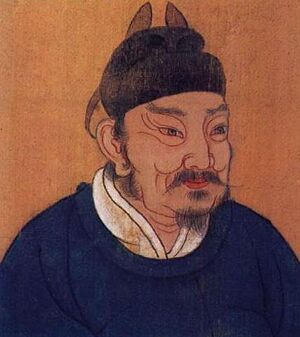Guo Wei facts for kids
Quick facts for kids Emperor Taizu of Zhou周太祖 |
|||||||||||||||||||||
|---|---|---|---|---|---|---|---|---|---|---|---|---|---|---|---|---|---|---|---|---|---|
 |
|||||||||||||||||||||
| Emperor of the Later Zhou dynasty | |||||||||||||||||||||
| Reign | 11 February 951 – 22 February 954 | ||||||||||||||||||||
| Successor | Chai Rong | ||||||||||||||||||||
| Born | 10 September 904 Yaoshan County, Xingzhou (modern Longyao County, Hebei, China) |
||||||||||||||||||||
| Died | 22 February 954 (aged 49) Kaifeng |
||||||||||||||||||||
| Burial | Song Mausoleum (嵩陵; in modern Xinzheng, Henan) 34°32′17.95″N 113°41′55.90″E / 34.5383194°N 113.6988611°E |
||||||||||||||||||||
| Spouse | See § Family | ||||||||||||||||||||
| Issue | Chai Rong (adoptive son) others |
||||||||||||||||||||
|
|||||||||||||||||||||
| House | Guo | ||||||||||||||||||||
| Dynasty | Later Zhou | ||||||||||||||||||||
| Father | Guo Jian (郭簡) | ||||||||||||||||||||
| Mother | Lady Wang (王氏) | ||||||||||||||||||||
| Guo Wei | |||||||||||||||||
|---|---|---|---|---|---|---|---|---|---|---|---|---|---|---|---|---|---|
| Chinese | 郭威 | ||||||||||||||||
|
|||||||||||||||||
Guo Wei (Chinese: 郭威) was a powerful leader in ancient China. He was born on September 10, 904, and died on February 22, 954. He is also known as the Emperor Taizu of Zhou (周太祖).
Guo Wei became the first emperor of the Later Zhou dynasty. This dynasty was part of a time in China called the Five Dynasties and Ten Kingdoms period. He ruled from 951 until his death in 954.
People sometimes called him "Sparrow Guo" (郭雀兒). This was because he had a special tattoo on his neck that looked like a sparrow. He started as a military leader in the Later Han dynasty. Later, he founded his own dynasty, the Later Zhou, in 951.
Contents
Guo Wei's Early Life
Guo Wei was born in 904 in a place called Yaoshan. At that time, the great Tang dynasty had fallen apart. China was broken into many small areas ruled by powerful leaders called warlords. These warlords were always fighting each other.
When Guo Wei was very young, his family moved to Taiyuan. His father, Guo Jian, became a government official in Shunzhou. He worked for a warlord named Li Keyong.
Soon after, Guo Jian was killed by another warlord's army. Guo Wei's mother, Lady Wang, also died when he was still a small child. He became an orphan and was raised by a distant relative, Lady Han.
Guo Wei grew up to be a strong young man. He loved fighting and soldiering more than farming. He also enjoyed gambling and often got into fights. His wife, Lady Chai, often told him to stop these activities.
Around age 17, he had to leave his home to avoid being arrested. He went to live with a friend in Huguan. Soon after, he joined the army of Li Jitao, a temporary leader in Luzhou.
Li Jitao was supposed to serve the Jin state, but he was secretly planning to switch sides. Because of this, he was more interested in finding brave soldiers than enforcing strict rules. One day, Guo Wei killed a mean butcher in the market after an argument. Li Jitao let Guo Wei go free and later asked him to serve in his army.
Guo Wei's Military Career
In 923, a new dynasty called the Later Tang was formed. It took control from the Later Liang dynasty. Li Jitao was killed a few months later. All his soldiers, including 19-year-old Guo Wei, became part of the horse-riding army.
Guo Wei could read, write, and was good with numbers. Because of this, he quickly became an officer. He loved to study books about how to plan battles. A close friend, Li Qiong, recommended a book called Spring and Autumn Annals for a Wider World. Guo Wei often asked Li Qiong to explain parts of the book he didn't understand.
In 927, the Later Tang emperor, Li Siyuan, led his army to stop a rebellion. Guo Wei was among the first soldiers to climb the wall of Xun. Guo Wei was serving under a general named Shi Jingtang at the time. Shi Jingtang saw Guo Wei's skills and asked him to manage military records. Guo Wei became very popular among the generals and government officials.
Rise to Power
The Later Tang dynasty was replaced by the Later Jin dynasty in 936. Guo Wei continued to serve in the military.
Later, the Later Han dynasty was founded by Liu Zhiyuan. Guo Wei had lived under the rule of these people for many years. He became an important military advisor to Liu Zhiyuan.
When Liu Zhiyuan died in 948, his teenage son, Liu Chengyou, became the emperor. There were many secret plots and power struggles in the court. Guo Wei took advantage of this. He led a sudden takeover and became the new emperor. He announced the start of his own dynasty, the Later Zhou, on New Year's Day in 951.
Guo Wei's Reign as Emperor
Guo Wei was the first Han Chinese emperor in northern China since 923. His rule brought stability to the region. He made important changes to help the many farmers in China. His government was strong and well-organized.
However, Emperor Guo Wei ruled for only three years. He died from an illness in 954.
Family
Wives and Children:
- Empress Shengmu, from the Chai family
- Pure Consort Yang, from the Yang family (911 – 947)
- Noble Consort Zhang, from the Zhang family (born 915, died December 950)
- Virtuous Consort Dong, from the Dong family (915-953)
- Unknown mothers of some children:
- Unnamed Prince, 1st son
- Guo Qingge, Prince of Shan (died December 24, 950), 2nd son
- Guo Yige (died December 24, 950), 3rd son
- Unnamed Princess, 1st daughter
- Unnamed Princess, 2nd daughter
- Princess Chang of Ju State (died 950), 3rd daughter
- Princess Shou'an, 4th daughter
- Married Zhang Yongde
- Princess Yongning, 5th daughter
 | Ernest Everett Just |
 | Mary Jackson |
 | Emmett Chappelle |
 | Marie Maynard Daly |

